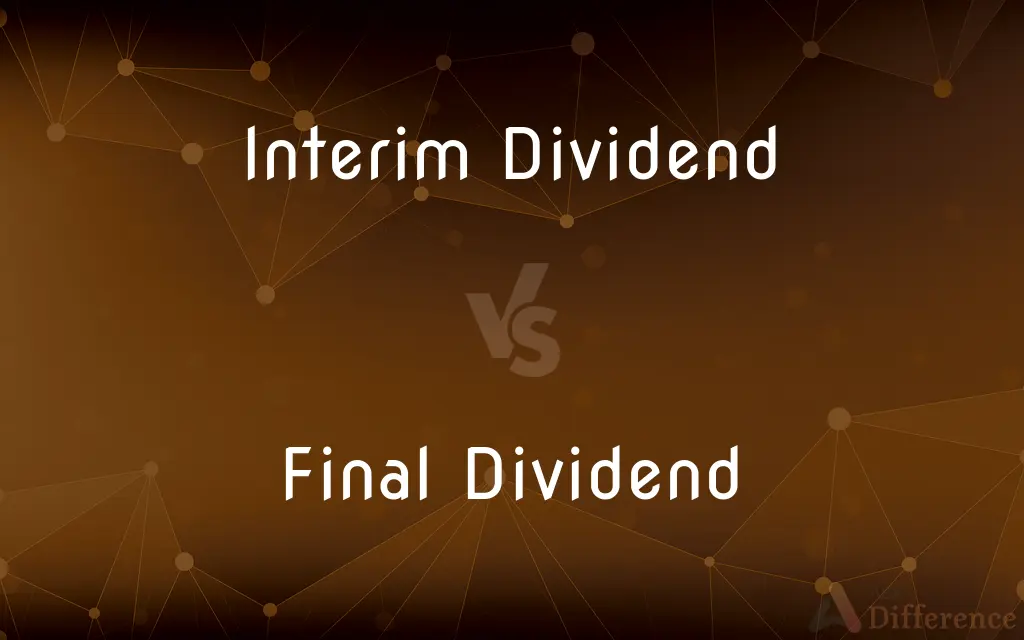Interim Dividend vs. Final Dividend — What's the Difference?
By Tayyaba Rehman — Published on December 10, 2023
Interim Dividend is a dividend paid during a company's fiscal year, while Final Dividend is declared after the year's end based on finalized earnings.

Difference Between Interim Dividend and Final Dividend
Table of Contents
ADVERTISEMENT
Key Differences
Interim Dividend is a distribution made to shareholders from the company's profits during its financial year. This type of dividend is usually declared and paid before the company's annual financial statements are finalized. Conversely, Final Dividend pertains to the distribution made after the close of a financial year, based on the company's finalized annual accounts.
The declaration of an Interim Dividend indicates the company's confidence in its anticipated full-year profitability. It provides investors with an early return on their investment. The Final Dividend, on the other hand, is based on the actual performance and reflects the company's profitability for the entire year.
Companies may choose to issue an Interim Dividend to maintain a consistent dividend payout throughout the year. This regularity can be attractive to investors. In contrast, the Final Dividend is more definitive as it relies on the audited financial results, ensuring the company doesn't over-distribute its profits.
Interim Dividend can be seen as a way to keep shareholders engaged and provide them with periodic returns, while Final Dividend establishes the overall profitability of the company for the year. Both types of dividends can be essential for determining the overall yield and attractiveness of a company's stock.
While both Interim and Final Dividends serve to reward shareholders, their timing and basis for declaration vary. Interim Dividend offers a glimpse into the company's expected annual performance, while Final Dividend solidifies the company's financial standing for the entire year.
ADVERTISEMENT
Comparison Chart
Timing
During the fiscal year
After the fiscal year ends
Basis for Declaration
Expected profitability
Actual, finalized profitability
Financial Statement
Before finalizing annual accounts
After finalizing annual accounts
Frequency
Can be multiple times a year
Typically once a year
Investor Perception
Indicates anticipated profitability for the year
Reflects actual profitability of the entire year
Compare with Definitions
Interim Dividend
Regular payouts during the fiscal year.
Investors favored the company for its consistent Interim Dividend distributions.
Final Dividend
The conclusive dividend after all financial assessments.
The board proposed a generous Final Dividend after reviewing the audited accounts.
Interim Dividend
A manifestation of a company's ongoing profitability.
The robust quarterly results led to a generous Interim Dividend.
Final Dividend
The year-end reward to shareholders based on total earnings.
The successful fiscal year resulted in a higher than expected Final Dividend.
Interim Dividend
A dividend paid out before the annual financial statements are finalized.
The company declared an Interim Dividend, showcasing its confidence in yearly profits.
Final Dividend
A distribution reflecting the company's overall annual profitability.
The Final Dividend was substantial, indicating a prosperous year for the company.
Interim Dividend
An early dividend reflecting expected full-year performance.
Based on the half-yearly performance, an Interim Dividend was announced.
Final Dividend
A dividend based on the company's finalized annual earnings.
After assessing the annual accounts, the Final Dividend was declared.
Interim Dividend
Preliminary distribution from ongoing year's earnings.
Shareholders appreciated the early payout through the Interim Dividend.
Final Dividend
The definitive dividend after the fiscal year concludes.
The shareholders eagerly awaited the announcement of the Final Dividend.
Common Curiosities
When is an Interim Dividend usually declared?
An Interim Dividend is declared during the company's fiscal year before the annual accounts are finalized.
Why might a company choose to distribute an Interim Dividend?
Companies might issue an Interim Dividend to maintain payout consistency, attract investors, or showcase anticipated profitability.
What determines the amount of the Final Dividend?
The Final Dividend is determined by the company's actual, finalized profitability for the entire fiscal year.
What happens if the Final Dividend is less than the Interim Dividend?
The Final Dividend reflects the full year's performance, so if it's less than the Interim Dividend, it might indicate the company didn't meet its expected annual profitability.
Which dividend, Interim or Final, gives a clearer picture of a company's financial health?
The Final Dividend, being based on audited financial results, gives a more accurate picture of a company's financial health for the year.
Are there tax implications for receiving either Interim or Final Dividends?
Yes, dividends, whether Interim or Final, may be subject to tax. Investors should consult local tax regulations or professionals for specifics.
Can a company declare multiple Interim Dividends in one fiscal year?
Yes, a company can declare several Interim Dividends throughout its fiscal year.
How often is the Final Dividend declared?
The Final Dividend is typically declared once a year after the fiscal year concludes.
Is the Final Dividend always higher than the Interim Dividend?
Not necessarily. The Final Dividend is based on annual results, while the Interim Dividend is based on expected profitability.
Can a company declare an Interim Dividend if it anticipates a loss for the year?
While possible, it's rare. Declaring an Interim Dividend when expecting a yearly loss can be seen as financially irresponsible.
Is the Final Dividend always issued?
No, if a company doesn't generate sufficient profits, it might not declare a Final Dividend.
Are both Interim and Final Dividends mandatory for companies?
No, dividend distribution, whether Interim or Final, is at the discretion of the company based on its financial health and policies.
Why is the Final Dividend considered more definitive?
The Final Dividend is based on audited financial results, making it a reflection of the company's actual annual profitability.
Can the declaration of an Interim Dividend affect a company's stock price?
Yes, announcing an Interim Dividend can positively influence a company's stock price as it indicates expected profitability.
Can a company retract its Interim Dividend announcement?
While uncommon, if a company faces unexpected financial challenges, it might reconsider its Interim Dividend declaration. However, such a retraction could negatively affect investor trust and stock prices.
Share Your Discovery

Previous Comparison
Maslow’s Theories of Motivation vs. Herzberg’s Theories of Motivation
Next Comparison
Mobile Phone vs. Cell PhoneAuthor Spotlight
Written by
Tayyaba RehmanTayyaba Rehman is a distinguished writer, currently serving as a primary contributor to askdifference.com. As a researcher in semantics and etymology, Tayyaba's passion for the complexity of languages and their distinctions has found a perfect home on the platform. Tayyaba delves into the intricacies of language, distinguishing between commonly confused words and phrases, thereby providing clarity for readers worldwide.












































